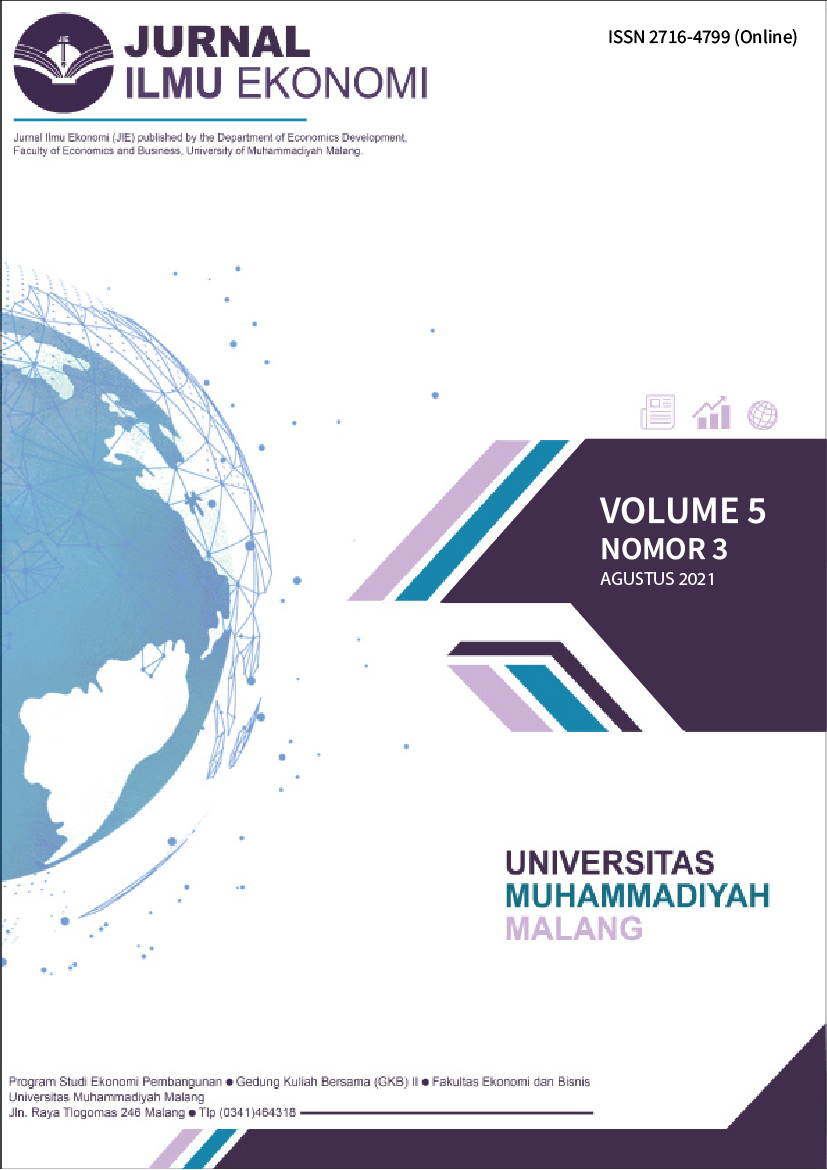Analisis Pengaruh Tingkat Pendidikan, Upah Minimum Provinsi dan Jumlah Industri Terhadap Kesempatan Kerja di Provinsi Jawa Timur tahun 1995-2020
DOI:
https://doi.org/10.22219/jie.v5i3.18729Abstract
In national economic development, there is a gap between the growth of the workforce and the willingness of various economic sectors to absorb labor, making job opportunities still a major problem in the economy. Employment opportunities are influenced by several factors, namely the level of education, provincial minimum wage , and the number of industries. The purpose of this study was to determine the effect and analyze the variables of Education level, Provincial Minimum Wage , and Number of Industries on Employment Opportunities in East Java Province 1995-2020. This study uses the Multiple Regression analysis tool method with time series. The results of the study show that simultaneously the variables of Education Level, Provincial minimum wage, and Number of Industries have a significant effect on Employment Opportunities in East Java Province in 1995-2020. The coefficient of determination (R²) indicates that 95 percent of employment opportunities and the remaining 5 percent are explained by other variables not examined. Partially the level of education, Provincial Minimum Wage, and Number of Industries have a significant effect on Job Opportunities in East Java Province.
Downloads
References
Badan Pusat Statistik. Jawa Timur Dalam Angka 1995-2021
Provinsi Jawa Timur.
Fahrizal, F., Zamzami, Z., & Safri, M. (2021). Analisis pengaruh jumlah tenaga kerja, tingkat pendidikan dan investasi terhadap pertumbuhan ekonomi melalui kesempatan kerja di Provinsi Jambi. Jurnal Paradigma Ekonomika, 16(1), 167–190. https://doi.org/10.22437/jpe.v16i1.11825
Fauzani, E. (2019). Analisis Pengaruh Pertumbuhan Ekonomi, Upah Minimum Provinsi Terhadap Kesempatan Kerja di Provinsi Jambi. Ekonomis: Journal of Economics and Business, 3(1), 49. https://doi.org/10.33087/ekonomis.v3i1.56
Puspita, N. P. ., & Sudibia, I. K. (2019). Analisis Determinan Kesempatan Kerja Dalam Sektor Industri di Provinsi Banten. 69–88.
Puspitasari, D. R., Daerobi, A., & Aisyah, S. (2017). Role of Wages, Industrial Sector and the Gdp Against Job Opportunities in Ngawi Regency Period 1987 - 2015. Optimum: Jurnal Ekonomi Dan Pembangunan, 7(1), 83. https://doi.org/10.12928/optimum.v7i1.7904
Rakhmawati, A., & Boedirochminarni, A. (2018). Analisis Tingkat Penyerapan Tenaga Kerja Sektor Industri Di Kabupaten Gresik. Jurnal Ilmu Ekonomi, 2(1), 74–82.
Sadariawati, R. (2010). Pengaruh Human Capital Dan Pertumbuhan Ekonomi Terhadap Kesempatan Kerja di Sumatra Selatan. 12.
Saputra, F. T., Rajuni, D., & Sukiman. (2021). FAKTOR-FAKTOR YANG MEMPENGARUHI KESEMPATAN KERJA DI PROVINSI BANTEN TAHUN 2010-2019. 11(1), 37–54.
Simanjuntak Payaman J. (2002). Pengantar Sumber Daya Manusia. LPFE UI.
Downloads
Published
How to Cite
Issue
Section
License
Copyright (c) 2022 Jurnal Ilmu Ekonomi JIE

This work is licensed under a Creative Commons Attribution-ShareAlike 4.0 International License.
Authors who publish with this journal agree to the following terms:
- For all articles published in the JIE (Jurnal Ilmu Ekonomi), copyright is retained by the authors. Authors give permission to the publisher to announce the work with conditions. When the manuscript is accepted for publication, the authors agree to the automatic transfer of non-exclusive publishing rights to the publisher.
- Authors retain copyright and grant the journal right of first publication with the work simultaneously licensed under a Creative Commons Attribution-NonCommercial-ShareAlike 4.0 International License that allows others to share the work with an acknowledgement of the work's authorship and initial publication in this journal.
- Authors are able to enter into separate, additional contractual arrangements for the non-exclusive distribution of the journal's published version of the work (e.g., post it to an institutional repository or publish it in a book), with an acknowledgement of its initial publication in this journal.
- Authors are permitted and encouraged to post their work online (e.g., in institutional repositories or on their website) prior to and during the submission process, as it can lead to productive exchanges, as well as earlier and greater citation of published work (See The Effect of Open Access).
This is an open access article and licensed under a Creative Commons Attribution-NonCommercial-ShareAlike 4.0 International License








